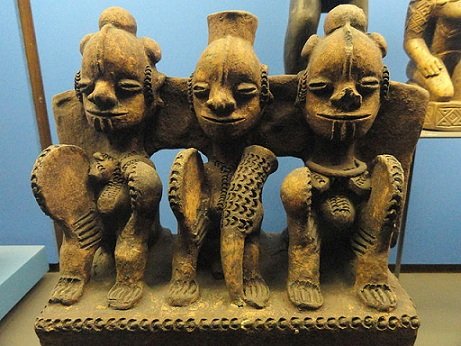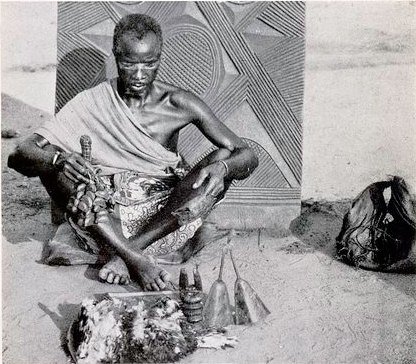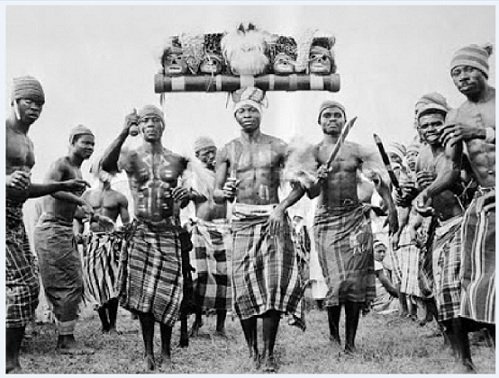ADSactly History : History Of Southern Nigeria [Part 2] - Igbo In The Pre-Colonial Era
In our last post, we took a look at the Yoruba tribe of South-western Nigeria, their origin and their cultural heritage. We saw some versions of the origin of the Yoruba ethnic group and their socio-political organizations. Here, we will be looking at the Igbo ethnic group in the South-eastern part of Nigeria. We will look at their history and origin, as well as their socio-political organization.

Igbo Tribe
Igbo ethnic group is another strategic and politically influential ethnic group in Nigeria. As a matter of fact, Igbo tribe is the 3rd largest tribe in Nigeria and predominantly found in the South-eastern states of Nigeria, though some other parts of Nigeria (like the South-south) have Igbo speakers. During the pre-colonial era till this present time, Igbos are generally known to be tilted towards trading and farming,
One very unique feature of the Igbo tribe is; even though there is a diversity of culture within the Igbo community, everyone is still connected to one central dialect called "Igbo izube" (meaning; central Igbo). Asides this, Igbos have a common socio-political structure. Before we go into this, let's look at the history of the origin of Igbo.
Origin of Igbo Tribe
Just like the Yoruba tribe that we looked at in our last post, Igbos have many versions of the story relating to their origin and we will take a few of them that have been generally accepted by many history scholars. Note: Some parts of this history were gotten from "oral tradition" (which is still recognized as a very valid and potent source of history).
The version of Nri
Nri is a place located in one of the South-eastern states of Nigeria (Anambra state to be precise) which has been believed by Igbo history scholars to be the true homeland for the Igbos in Nigeria. Nri was the central hub of Igbos in the pre-colonial times and was regarded as the seat of power. The kingship in Igbo land (popularly called "Eze") was inaugurated in Nri.
According to Professor Onwuejeogwu in his book titiled "An Igbo Civilization: Nri Kingdom & Hegemony", the version of Nri is generally accepted by Igbos as part of the history of their origin. They believed that the almighty creator (called Chukwu Okike Abiama) formed humans from the sky and placed them in Nri to multiply and fill the earth. This is why many Igbo history scholars have quipped that Nri is not only the ancestral homeland of Igbos but mankind as well. The religion predominantly practised by Igbos are Christianity and traditional religion and they are known to have strong religious inclination. Looking at this holistically, the version of Nri is a creationist story, of course, it does not fit into the perspectives of evolutionists.
The cultural leader of the Igbo land in the ancient times was Eri who was believed to be sent from the sky by Chukwu Okike Abiama (almighty creator) to populate the earth; he also established the Nri clan. Eri had children who included the two very popular ones "Agulueri" and "Umuleri" who formed the present day Aguleri clan and Umuleri clan (Nigerian Igbos can relate to these names). The children of Eri later increased and started multiplying, and that was how various parts of Igbo land in South-east and some other parts of Nigeria (like Igala) were born.
The Version of Israeli
This is migratory account rather than a creationist account. Some Igbo scholars have said that the present day Igbos and the present day Israelis shared a common ancestry. As a matter of fact, Igbos have been said to have migrated from Israel. The reason behind this is the similarity between the Igbos and Israelis; in culture and whatnot. Even the dressing pattern of Agulueri and Umuleri clan is similar to that of the ancient Hebrew, at least I've been to the present day Aguleri and Umuleri to witness this first-hand [@samminator speaking here]. This is the reason Igbos have believed to have a Hebrew descent. They normally refer to themselves as "Umu Chukwu Abiama" (Children of the almighty creator).

Even till this present time, some Igbo people look at themselves as one of the lost tribes of Jacob (Israel) which found their way to Nri. However, whether they believe the creationist account or the migratory account, one very common denominator in both stories is "Nri" - which is believed to be the ancestral home of Igbos.
Igbo Administration and Socio-political Organizations
Do you remember what I said in the last post about the Yorubas having a central authority, Alaafin? Igbos during the pre-colonial times were largely acephalous without a central political head to govern the entire Igbo land. However, there were instituted authorities with their delegated duties, but none of them had absolute power. The very strategic instituted authority was the "Amala Oha". This was the Igbo version of the Yoruba Oyomesi (it can be regarded as general assembly in this present time).

The Amala Oha was tasked with the formation and enforcement of laws and regulation within the Igbo community. During the pre-colonial time, the Amala Oha convened at open spaces (like village square) where all adult males were mandated to be in attendance to discuss about the issues of the land. It was a democratic setting rather than the monarchical nature exhibited by the Oyomesi in Yoruba land.
The Igbo elders were selected as the main fulcrum upon which the Amala Oha administration rested on and they were highly respected by members of the public. The young adults had their own duties to play too - like formation of Age-groups, to enforce laws and other democratic functions. One very unique characteristics of the Igbo administration in the pre-colonial time is the democratic setting where everyone's opinion counts, unlike the Alaafin, Obas and Oyomesi the wielded tremendous amount of power and authority.
Till this present time, the Igbo tribe has maintained a democratic setting, though the acephalous nature is less pronounced because of the institution of heads of various socio-political organizations in Igbo land. Before a law is passed in Igbo land, there will be a deliberation before the council of elders and if majority of the council members favour the law, that is when it will be passed and enforced. This feature has been passed on from generation to generation in Igbo land and has remained one of the features that has distinguished Igbos from other ethnic groups in Nigeria.
Authored by @samminator
Click on the coin to join our Discord Chat

Witness proposal is here:
Go To Steem Witness Page
In the bottom of the page type: adsactly-witness and press vote.

Use small letters and no "@" sign. Or, click here to vote directly!
Thank you!
He had little knowledge of the Igbos, unlike the Yoruba (perhaps more information about them has been spread in America because of their religious influence, as he told you). Thanks to your pos I inform myself about fundamental aspects of sa ethnicity and culture. I find very interesting the democratic conscience (to call it in some way) that they had. Apart from the distances, also in ancient cultures of America, such as the Maya, this practice (the consultation) existed; this is clearly stated in its main textual production: Popol Vuh, which translates precisely "Book of the Council (or of the community). Greetings, @samminator.
I'm glad you enjoyed the post. There are more things to the history of Igbo than can be written in just one post. This is just a summary
Great follow-up, @samminator.
In african-american literature, most of the early writers, such as Wheatley and Equiano enphasized this aspect of "negro history". Those slaves that had been taken to amaerica old enough to remember something from their lives in africa used those memories or the memories constructed from consultations to fellow slaves to put together a racial history that would allow them to present themselves not as the barbarous and inferior race whites claimed they were, but as an ancient, sophisticated and culturally and philosophically advanced group.
Exactly. Many thanks for this nice comment buddy. There are, indeed, many versions of the same story and we're only left with "oral tradition" to decide which one holds more potency
@samminator, The history of Human Beings is very diversified and why human beings are created there are many theories and no one knows which theory is absolutely right.
But whatever it is, nothing can stay mystery forever and one day truth will be revealed. Stay blessed.
Posted using Partiko Android
Your last statement is absolutely true: Mysteries must be unravelled one day.
Thanks Chireerocks
Welcome and have a blessful time ahead.
Posted using Partiko Android
He knew almost nothing about the Igbo. About the Igbo I only heard about the footballer Jay-Jay Okocha. It's good to know something new, thanks to this post. As in most primitive peoples, there are two versions of his creation. Generally, there are magical versions, transmitted orally and of which there is no greater evidence than the stories told to us by the elders. And like many of the villages, the elders are respected and are fundamental authorities when it comes to making decisions. What a pity that today, the people with the most power are not the wisest and most respected. As for Okocha, I always remember him as one of the most important figures in the imposing Nigeria that beat Argentina many years ago. Greetings, @samminator.
I was born in Igbo land and have spent a greater percentage of my life in Igbo land. I can say that Igbo culture is very unique and they have maintained a unique tradition.
About Jay-Jay Okocha (Pa Jay, as we call him here), he is a football icon and well respected in NFA.
I'm glad you have learnt something new from this post. Thanks for reading Nancy
beautiful picture, definitely has a good story, good post, I like it @adsactly